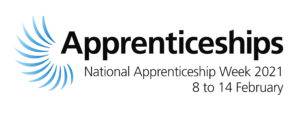The 14th National Apprenticeship Week (NAW2021) runs from 8-14 February. Appropriately for the commercial vehicle industry as it rapidly adopts emerging, emissions-reducing technologies in a post-Brexit, Covid-hit world, this year’s theme is ‘Build the Future’.
A proliferation of vehicle technology means that apprenticeships have rarely been so important as in 2021, especially as the sector seeks to replenish a skills pool with a focus on home-grown talent. In the words of the Minister for Apprenticeships and Skills, Gillian Keegan, “It’s been a tough year for everyone, but we want the theme to be a springboard to look ahead to how apprenticeships can futureproof workforces and boost careers.”
The commercial vehicle industry has a proud history of nurturing its talent through apprenticeships and a wide array of programmes continue to evolve to meet the sector’s needs. Partnerships between colleges, higher learning institutes, vehicle manufacturers, tier suppliers and dealership groups offer a focused, clearly defined route to a career.
“It has been fantastic to see how employers of all sizes have gone above and beyond to ensure apprentices can continue their studies during this unprecedented time,” continues Keegan. “The week is also an opportunity to shine a light on how apprentices of all ages and backgrounds are helping to transform businesses across the country.”
In recent weeks Motus Commercials, for example, has announced several award-wins for its apprenticeship scheme that runs across its 30 DAF dealerships in the UK. Having run for almost 70 years, its apprenticeship programme is currently progressing the careers of 104 participants and covers technical and administrative business roles. The company is one of the sector’s few representatives in the Top 100 Apprenticeship Employers 2020 list, which is compiled by the UK government, and also received the Princess Royal Training Award 2020.
However, as Sarah Bardens, national apprenticeship manager at Motus Commercials explains, the success of any programme is reliant on the business retaining new talent: “We are proud to have achieved a 55% growth in the number of recruits on the scheme in the last three years and a 97% retention rate. We continue to invest heavily in our apprentices and their long-term career goals. We are passionate about delivering outstanding training and personal mentoring, as well as opportunities to learn and engage with other apprentices across the DAF dealer network.”
A wide range of programmes are run by vehicle manufacturers such as Renault Trucks, Scania, Volvo Trucks and Mercedes-Benz. For example, Renault’s academy provides apprentices with the opportunity to work on the latest vehicles using the most up-to-date diagnostic equipment under the tutelage of a trained mentor. Its Heavy Vehicle Advanced Apprenticeship Programme is run over four years and covers all aspects of vehicle technology. The majority of time is spent at a dealership gaining first-hand experience, with visits to the company’s Training Academy providing in-depth knowledge.
Scania states that it recruits between 80 and 120 apprentices each year on programmes that last up to four years, with 97% achieving their desired qualification.
The Mercedes-Benz Apprentice Academy, too, has graduated over 1500 apprentices since establishment in 1995. Having invested in a £3m dedicated facility at its Milton Keynes UK headquarters, the company claims that its apprentice recruitment has been growing at a year-on-year rate of 30%.
Volvo Trucks, which runs a Heavy Vehicle Apprenticeship Programme that follows a similar timeframe as others, lasting up to four years, is under no doubt as to the continued importance of apprenticeships to the commercial vehicle industry despite the challenges posed by Covid.
“Volvo Trucks is very committed to apprentice development and has continued to recruit through the pandemic; we will also be investing in new cohorts later in 2021,” explains Volvo Group UK CD Manager (Delivery and Apprenticeships). “We have all been through very challenging times, therefore our workforce development is vital. We have had to look at different ways to approach training, and we are regularly using online platforms to develop our workforce. The pandemic has made us look at things differently in competence development. We have spent time developing methods to deliver practical subjects virtually to ensure current apprentices progress well, and we will continue to use a blended approach going forward due to the results we have seen.”
Despite being so heavily impacted by Covid, there is good news for apprentices seeking a career in the bus and coach sector. The Go-Ahead Group this week announced that it will be hiring more than 1,100 apprentices across the UK in 2021, an increase of 400 over the previous year’s target.
“In spite of the pandemic, we will continue promoting and supporting our people,” explains Go-Ahead’s group people director, Scott Maynard. “We will always need great people to drive our buses, maintain our trains and help passengers on their journeys. Go-Ahead is built on apprenticeship programmes – many of the senior leaders in our organisation began as apprentices themselves.”
“There are currently around 7,000 apprenticeship opportunities on the Find An Apprenticeship website which will benefit individuals, 
“There is no doubt that National Apprenticeship Week 2021 will be different this year in how we celebrate apprenticeship success,” explains Peter Mucklow, Director, Apprenticeships, Education and Skills Funding Agency. “We are however continuing to ask employers to encourage everyone to consider how apprenticeships can help build organisations for years to come; whilst showing the clear return on investment realised when apprentices are brought into the business. Employers are helping the nation to #BuildTheFuture through apprenticeships.”











